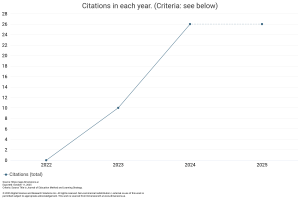Role of Entrepreneurship Education Management in Creating Entrepreneurship Competitive Advantage in Students: Case Study on F-Clean Products at MA Al-Rahman Sukabumi
DOI:
https://doi.org/10.59653/jemls.v2i01.487Keywords:
Education Management, Entrepreneurship, Competitive AdvantageAbstract
Based on a preliminary study conducted by researchers, the F-CLEAN liquid soap company sells liquid soap products according to their use which can be delivered directly to consumers. However, researchers found a problem in the field, namely that entrepreneurship coaching was going well, but there were some students who still did not understand entrepreneurship. The aim of the research is to analyze the role of entrepreneurial education management in creating entrepreneurial competitive advantages for students at MA Al-Rahman Sukabumi. The research method uses a case study with a qualitative approach. Data collection techniques use interviews, observation and literature study. Data analysis using the NviVo 14 application. The research results show that entrepreneurship education management has a role in creating a competitive advantage in entrepreneurship for MA AL-RAHMAN Sukabumi students. The role of entrepreneurial management is to foster an entrepreneurial spirit in MA AL-RAHMAN Sukabumi students through entrepreneurship learning, business planning, direct practice of F-CLEAN (in the organizing section), implementation and evaluation. Meanwhile, the role of educational management is to create competitive advantage through the perspective of customer value (not easily imitated), having interest, self-confidence and the unique value of special F-CLEAN products. With the role of entrepreneurship education management, it is hoped that inhibiting factors such as students' lack of interest in entrepreneurship and being shy about starting a business can be overcome through entrepreneurship education management.
Downloads
References
Aditma, R. A. (2020). Pengantar Manajemen Teori dan Aplikasi. Kepanjen: AE Publishing.
Caturaman, A. (2016). Keunggulan Bersaing Bisnis. Jakarta: Erlangga.
Cresswell, J. W. (2016). Research Design, Pendekatan Metode Kualitatif, Kuantitaif, dan Campuran. Yogyakarta: Pustaka Pelajar.
del Brío González, J. Á., Mitre Aranda, M., & Barba-Sánchez, V. (2022). Environmental awareness and the entrepreneurial intention in university students: Direct and mediating effects. International Journal of Management Education, 20(3). https://doi.org/10.1016/j.ijme.2022.100719
Effendy, M. (2017). Pendidikan Kewirausahaan Edisi Revisi. Jakarta: Balai Pustaka.
Fachrunissa, T. d. (2020). Pemanfaatan NVivo dalam Penelitian Kualitatif. Malang: UNM Press.
Kosasih. (2021). Analisis Deskriptif Karakteristik Jiwa Wirausaha UMKM dalam Pembentukan Cluster Industri . Ekono Insentif | ISSN (p): 1907-0640 | ISSN (e): 2654-7163 Vol 15 No 1, 20-27.
Mahmudah, M. (2020). Manajemen Mutu terhadap Peningkatan Kualitas Lembaga Pendidikan Islam. Jurnal Keislaman, 3(1). https://doi.org/10.54298/jk.v3i1.3114
Mattos, L. K. de, Flach, L., Costa, A. M., & Moré, R. P. O. (2023). Effectiveness and Sustainability Indicators in Higher Education Management. Sustainability (Switzerland), 15(1). https://doi.org/10.3390/su15010298
Mulyanti, L. N. (2023). Pengaruh Kualitas Pelayanan Dan Kualitas Produk Terhadap Kepuasan Pelanggan. Inovatif: Jurnal Ekonomi, Manajemen, Akuntansi, Bisnis Digital Dan Kewirausahaan, 2(2), 62–71., 62-71.
Nata, A. (2018). Manajemen Pendidikan. Jakarta: Erlangga.
Nur, A. (2015). Kewirausahaan. Surakarta: UMS Press.
Sugiyono. (2015). Metode Penelitian. Bandung: Alfabeta.
Sugiyono. (2019). Metode Penelitian Kualitatif, Kuantitatif dan R&D. Bandung: Alfabeta.
Syarifudin, N. A., & Setiyani, L. (2023). Analysis of Higher Education SIAKAD Website Security Gaps Using the Vulnerability Assessment Method. International Journal of Multidisciplinary Approach Research and Science, 1(03). https://doi.org/10.59653/ijmars.v1i03.177
Syukur, A., Nata, A., Rosyada, D., & Suralaga, F. (2023). Learning Management of Islamic Religious Education (PAI) Based on Multiple Intelligences at SMA IT Insan Mandiri Cibubur. International Journal of Islamic Thought and Humanities, 2(1). https://doi.org/10.54298/ijith.v2i1.52
Vip Paramarta, K. F. (2021). Peningkatan Kualitas Pengolahan Produk Makanan Kerupuk Dorokdok Bagi Kelompok Pengusaha Mikro di Sukagerang Kabupaten Garut. J-ABDI: Jurnal Pengabdian Kepada Masyarakat, 1(4), 671–680. https://doi.org/10.53625/jabdi.v1i4.1697.
Yohana, C., Rachma Dania, R. F., & Prihandono, D. (2021). Study of the influence of education and literation of entrepreneurship in vocational high schools: Indonesian case. Academic Journal of Interdisciplinary Studies, 10(1). https://doi.org/10.36941/ajis-2021-0004
Zahro, L. (2020). Strategi Kepala Sekolah dalam Pembinaan Iklim dan Budaya Sekolah di SDI Taruna Surabaya. Jurnal Keislaman, 3(1). https://doi.org/10.54298/jk.v3i1.3118
Zhu, Z. (2023). Analysis of the innovation path of university education management informatization in the era of big data. Applied Mathematics and Nonlinear Sciences. https://doi.org/10.2478/amns.2023.1.00119
Downloads
Published
How to Cite
Issue
Section
License
Copyright (c) 2023 Siti Rohmah, Vip Paramarta, Dety Mulyanti

This work is licensed under a Creative Commons Attribution-ShareAlike 4.0 International License.
Authors who publish with this journal agree to the following terms:
- Authors retain copyright and grant the journal right of first publication with the work simultaneously licensed under a Creative Commons Attribution-ShareAlike that allows others to share the work with an acknowledgement of the work's authorship and initial publication in this journal.
- Authors are able to enter into separate, additional contractual arrangements for the non-exclusive distribution of the journal's published version of the work (e.g., post it to an institutional repository or publish it in a book), with an acknowledgement of its initial publication in this journal.
- Authors are permitted and encouraged to post their work online (e.g., in institutional repositories or on their website) prior to and during the submission process, as it can lead to productive exchanges, as well as earlier and greater citation of published work (See The Effect of Open Access).
























